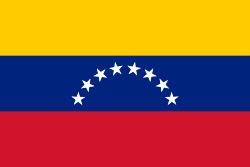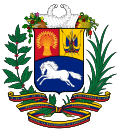Venezuela
country in South America From Wikipedia, the free encyclopedia
Remove ads
Venezuela, officially the Bolivarian Republic of Venezuela, is a country in northern South America. The official language is Spanish, and the capital city is Caracas.
Other languages spoken in Venezuela include Carib, Guahibo, Warao, Wayuu, Pemon, and Piaroa.
Remove ads
Geography
The country has a wide range of geography that includes islands in the Caribbean Sea, coastal areas, highlands, and parts of the Andes Mountains. Venezuela is famous for being the home of Angel Falls, the world's tallest waterfall, in the Bolivar state.
Economy
Venezuela's economy is based on oil, cotton, cocoa, sugar, coffee, and tobacco.
Venezuela has one of the largest oil supplies in the world, and it produces a large amount of oil. It also has a very large supply of fossil fuels, gasoline, and minerals.
There are economic sanctions against Venezuela (as of 2025's fourth quarter); The sanctions are coming from the United States [and some other countries].[7][8] The sanctions are costing Venezuela, billions of euro, every year.[9]
In regard to inflation: It is between "20% and 30% a month", according to an estimate quoted (November 2025) by a media outlet; The estimate is for the capital city.[7]
In regard to (relatives sending money from abroad, or) remittances: About 7 million Venezuelans have moved to other countries, during the rule of the Maduro government;[7] Many of those Venezuelans send money to relatives (back home).
Remove ads
People and history
Ancient Venezuelans came from the east, west, south, and north. Christopher Columbus was the first European to enter Venezuela, but there had been indigenous people living there for a long time.
European colonialism
Also see: Colonialism and Atlantic slave trade
When white Europeans (like the British, Spanish, and French colonial empires) conquered territory in the Americas, they took their black African slaves to America to work. The Spanish Empire conquered Venezuela and brought in slaves from Africa.
At this time, black people had no rights; they just worked for food. Because of the colonial period, Venezuela's population today is very racially mixed.
The Spanish taught Roman Catholicism, and many native people converted. Today, almost all Venezuelans (96%) are Catholics; just 2% are Protestant.
For a long time, society was headed by white creoles: people in Venezuela who were descended from Spaniards, but considered Venezuela home. Other Venezuelans did not like that, and they started thinking about independence. On July 24, 1823 Venezuela won its independence, led by Simón Bolívar.
Modern history
Venezuela's modern history was shaped by a number of people, including President Romulo Betancourt, who replaced a military dictatorship with a democracy.
By the 1970s, Venezuela had become rich from oil revenue, but it had problems in the 1980s and 1990s. In 1999 Hugo Chávez became president and tried to remake Venezuela into a socialist state. While popular at first, the economic changes made by Chavez and the next president, Nicolás Maduro, caused a massive economic depression in the mid-2010s. The current president is disputed.
Demographics
The population of Venezuela is about 28,000,000 people.[10][11] The ethnicities of the population are:
- 65%: Multiracial.
- 20%: European.
- 10%: African.
- 5%: Amerindian.
Other information
The Crisis in Venezuela[12] started in 2010 (and has been ongoing for 15 years, 6 months, 3 weeks and 2 days.)[13][14]
Foreign relations
United States–Venezuela relations. In 2025, the U.S. started attacks from the air, against what was thought to be drug boats. The attacks were part of a military buildup in the Caribbean Sea.[15][16] Earlier that year, the US government said that gangs such as Cartel of the Suns, and Tren de Aragua, are terrorist organizations.[17][18][19] Earlier (2019), the U.S. took away its diplomats from the U.S. embassy in Caracas.[20] Earlier that year, Venezuela's president said that the Venezuelan embassy "and all consulates in the U.S. would be closed", according to media.[21]
Remove ads
Gallery
- Los Próceres, Caracas - Distrito Capital
- Plaza Francia – Miranda state
- Coin
- Humboldt planetary (Caracas)
- Cattleya mossiae
- Stamp 1893
- Puerto Ayacucho – Amazonas state
- Puerto Nutrias – Barinas state
Related pages
References
Wikiwand - on
Seamless Wikipedia browsing. On steroids.
Remove ads











